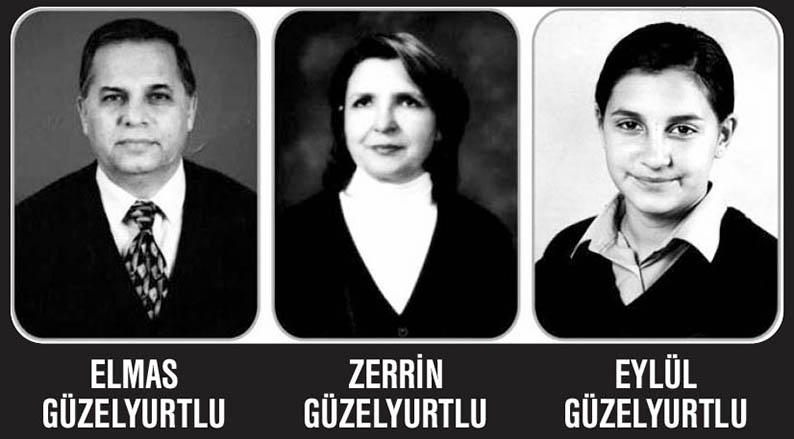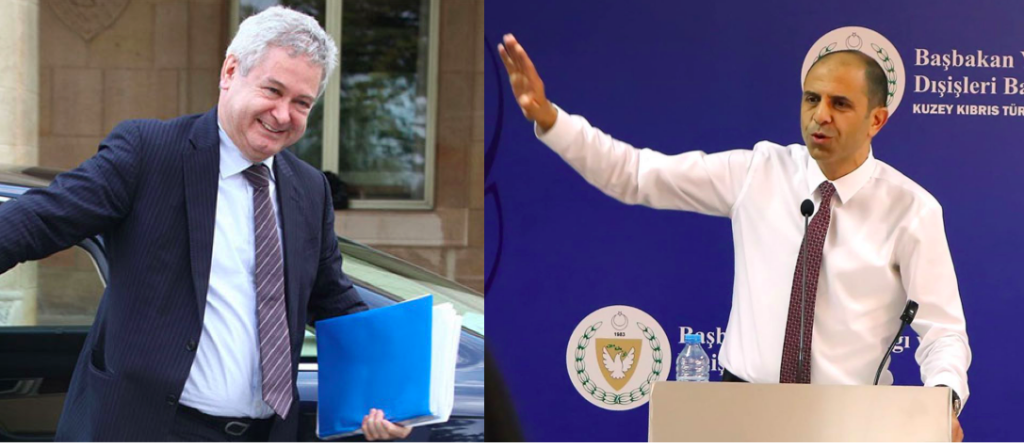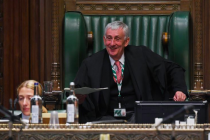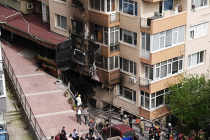Leading politicians in the Turkish Republic of Northern Cyprus (TRNC) have hailed an exchange of murder suspects with the Greek Cypriot South.
United Nations peacekeepers, acting as go-betweens, handed over Pakistani citizen Muhammad Salman to TRNC police, Deputy Prime Minister and Minister of Foreign Affairs Kudret Özersay (pictured above, right) announced on Thursday, 13 June.
Mr Salman is the prime suspect in the murder of artist and teacher Hasan Işık Özgöçmen, 53, who was killed last year.
His body was found in woodland in İskele on 30 September, 2018. Reports said he had been throttled to death with his own belt.
Mr Salman then fled across the border to South Cyprus in a bid to escape justice, taking advantage of the lack of political recognition between the two states.
He was arrested in Limassol by Greek Cypriot police and later convicted of “illegal entry” and was awaiting deportation, it was reported.
The prisoner was exchanged at the Ledra Palace checkpoint for four Georgian nationals wanted by Greek Cypriot police over the gangland killing of Ernest Leonides in Limassol in February 2018.
“political excuses cannot act as justification to offer refuge to criminals, protect them and reward them with impunity”
The exchange came after the TRNC’s Foreign Ministry in March accused the Greek Cypriot administration of “sheltering” Mr Salman in a “refugee camp” in Larnaca where “other asylum seekers are held”.
It said that “political excuses” put forward by the Greek Cypriot leadership “cannot act as justification to offer refuge to criminals, protect them and reward them with impunity”.
The statement also said that Greek Cypriot authorities were “refraining from sharing any information” regarding those wanted in connection with the murder of Gökhan Naim, a businessman who was gunned down outside his home in Lefkoşa in March, just yards from a primary school.
Hailing last week’s suspect swap as an important deterrent against crime, Prof Özersay said it had come about following a series of talks involving top Greek Cypriot negotiator Andreas Mavroyiannis (pictured top left) .

He said that up until “very recently” it had only been possible for the two sides of Cyprus to share information through the Bicommunal Technical Committee on Crime and Criminal Matters.
Thanking Mr Mavroyannis, UN and Greek Cypriot officials, and his own personnel, Prof Özersay said: “This situation should not be exploited politically. This is a cooperation occurring as a result of an unofficial consensus.
“The sides should be in a dialogue to the advantage of both sides and cooperate. We have been in dialogue on this issue and some other issues with the Greek Cypriot negotiator Andreas Mavroyiannis for a while.
“This is a positive development. We will continue to cooperate to hand over criminals, especially foreign nationals, who commit a crime on one side of the island and then escape to the other side of the island in an attempt to avoid being tried.”
News of the prisoner exchange was welcomed by TRNC President Mustafa Akıncı, who said he hoped such cooperation would continue.
“The lack of political recognition is no excuse to harbour criminals, no matter who they are or where they come from,” he said.
Also welcoming the announcement, TRNC Deputy Speaker of Parliament Zorlu Töre said that cooperation on criminal matters must be a responsibility which “neither side should try to avoid”.
“No tolerance should be shown to violence, terrorism or aggressive acts which create insecurity,” he said in a written statement.
“The Greek Cypriot administration must reinstate the rights of the Turkish Cypriots it has been denying to them since 1963 and should put an end to their isolation.
Hakkı Önen, co-chair of the bicommunal crime committee, congratulated all those involved for “bringing such criminals to justice”.
There was no official comment from the Greek Cypriot government or Mr Mavroyiannis, although a source was quoted by the South’s Cyprus News Agency as saying that there was a “mutual understanding” that criminals should not be allowed to take advantage of the island’s division.

The lack of cooperation in fighting crime was highlighted by a European Court of Human Rights (ECHR) judgment in January over the 2005 murder of a Turkish Cypriot family in South Cyprus.
The killers suspected of shooting dead Elmas and Zerrin Güzelyurtlu and their daughter Eylül fled to North Cyprus.
The Turkish Cypriot authorities had wanted to try the suspects in the TRNC courts but South Cyprus investigators refused to hand over all their evidence, claiming it would amount to the transfer of a criminal case to an “unrecognised entity set up within its territory” – a view shared by the ECHR.
The ECHR instead blamed Turkey for ignoring extradition requests from South Cyprus, despite also holding the Greek Cypriots responsible for the failure to bring the killers to justice in a previous ruling.





